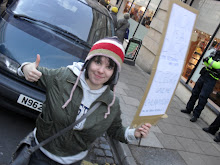Thus far, I have been a total failure of a blogger. Please accept my humblest apologies. There are various excuses, from the true (essays, life) to the psychological (perfectionism) to the reality (laziness; lack of motivation). Regardless, I am prepared to hold my hands up; if I were truly engaged with current internet memes*then I might shout “FAIL!”
My research on the topic of ‘FAIL!’ is typically shallow, but the phenomenon is best summed up in this YouTube video from the (excellent) Rocketboom Institute’s Know Your Meme series: http://knowyourmeme.com/memes/fail. To summarise, ‘FAIL!’ derived from a genuine translation error in a 1998 video game, but grew into an image macro, such as the (also excellent) collection updated daily on FAIL Blog (http://failblog.org/).
FAILs are a hilariously callous and supremely modern form of Schadenfreude.** Essentially, a You’ve Been Framed 2.0; what it lacks in Harry Hill’s superlative narration, it makes up for in the sheer immediacy of the image’s impact. Admit it, Humanity: you love seeing other people suffer, don’t you? FAIL is the web’s response to this basic human instinct.
Originally, I (pretentiously) titled this blog ‘FAIL!: Harmless Lolz?’, like some self-satisfied documentary maker, simultaneously sneering at the ignoramii who use this language and the uninformed viewers who don’t understand it. But I clearly enjoy FAILs, despite an incredibly guilty conscience; my mind can’t help but turn over and over the implications for those involved. Regardless, the majority are simple acts of stupidity, and frequently harmless. My personal favourites are linguistic errors in signs (well, they would be, wouldn’t they?), which ultimately hurt no-one and are the direct result of ignorance or coincidence, rather than malicious malintent.
But ‘FAIL!’ has been absorbed into daily English language, at least in my age group. And I can’t help feeling that it is an unnecassarily cruel phrase to have bandied about in everyday usage. When removed from its online context, it seems to lose its innocence. Perhaps I am being naive – logically there is no difference between an individual being shamed in a photograph online and verbally in the present. I suppose both are just as hurtful. If anything, the former has evidence of their misfortune published to thousands of strangers, and they may be humiliated in their community. A verbal ‘FAIL!’, often from one friend to another, is a momentary joke, and usually the situation is far more manageable than some preserved examples.
Still, I can’t help but recoil when I hear someone shout “FAIL!” in reality. It is a word that makes sense on the screen, deriving its specific meme-meaning from video games and evolving into an internet phenomenon. But spoken English, as rapidly developing as it is, is slow to catch up to the web, and still holds too many connotations, for me at least, of ‘failure’.
Take, for instance, the phrase ‘I fail at life.’ It has seeped into slang and superficially denotes nothing more than wasted time. However, look at it deeper, and its poignancy is evident: Do we truly believe that we have failed to succeed? To take opportunities presented to us? To live up to expectations? To perform the seemingly simple task of living? Maybe I look too deeply.
Maybe I look too deeply. Perhaps my generally bleak and godless outlook on humanity means I am unable to simply accept an occasionally joyful and frequently harmless new usage of an old word.*** I should probably get over my incredibly pernickety reaction and learn to spend my time in more constructive ways than rambling on (and on) about mere words. But I can’t stop feeling uncomfortable when it’s used; this is the overarching reason that I won’t shout “FAIL!” in relation to my ability to reliably write a blog.
Oh, that, and I’m not a complete She-Cock.
* Read: geek with little to no life away from his broadband connection.
** Schadenfreude is a German word, literally translated as ‘harm-joy’, meaning a malicious joy in the misfortunes of others.
*** Earliest usage, according to the Oxford English Dictionary, being 1297.
